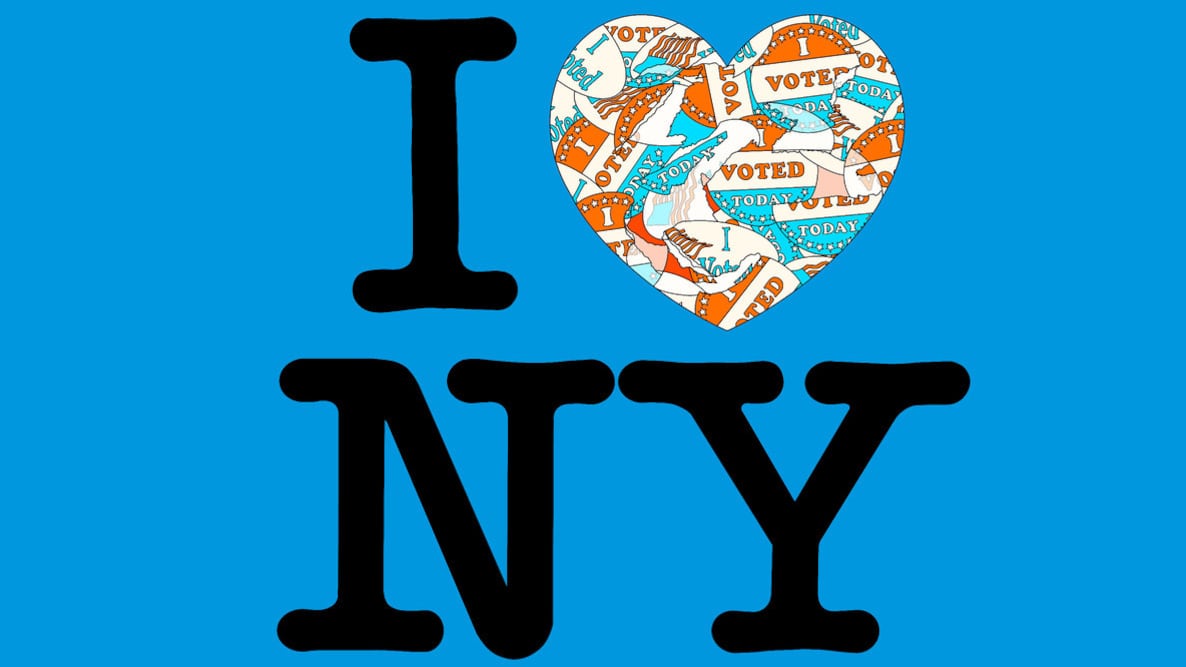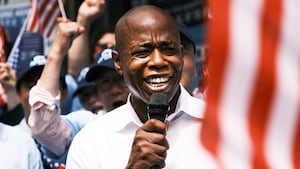With all the ballots cast and primary election day over, New Yorkers won’t know for certain who their next mayor will be for at least a week, when absentee ballots are finally collected and opened—and when the city’s new ranked choice system comes into play as votes are counted and recounted, candidates at the bottom are eliminated, and their supporters’ votes then move to their next pick.
What looks possible, if not likely, is that New York City's general election pits an ex-cop in Democrat Eric Adams—who was way ahead after in-person, first-choice ballots were counted—against a pretend cop in Republican Curtis Sliwa, the founder of the red beret-wearing Guardian Angels.
New Yorkers know for certain that that mayor won’t be a candidate who never voted for a mayor until voting for himself this year, as Andrew Yang—who immediately became the frontrunner in the polls and dominated media coverage after jumping into the Democratic race in January—faded in the homestretch and ended up conceding on election night, saying that the math (Get it?) didn’t add up. Yang stressed his roots in the city, where he’s lived for a quarter-century, and vowed he’d remain committed to public service here going forward. We’ll see.
The other two leading candidates in a crowded Democratic field, Kathryn Garcia, the former sanitation commissioner running on a platform of competence, and Maya Wiley, the former lawyer to outgoing Mayor Bill de Blasio running on police reform, didn’t concede. But with voters’ first picks on the in-person ballots counted, both of them were significantly behind Adams, the accomplished former cop and former Republican who’s been a leading candidate throughout the race but who flew under the radar until recent weeks as progressives and the national press fixated on Yang.
Adams’ base of support among Black voters held steady; he collected endorsements from organized labor and support from developers; and his message stressing public safety as a predicate to prosperity resonated after a year where the number of gun violence victims doubled.
Adams’ allies had challenged the new ranked choice voting system in court and he spent the campaign’s closing weeks fending off questions about where he lives and his real estate holdings that he said were motivated by the same racism that led Donald Trump to question the birthplace of Barack Obama. He also suggested that racism was behind Garcia and Wiley’s decision to campaign together, a common strategy in ranked choice elections, and behind an unflattering feature about his political ties in New York magazine.
But after an impressive election-night show in which he claimed a little more than 250,000 first-choice votes, 75,000 more than Wiley and nearly 100,000 more than Garcia, Adams took a unifying tone as he all but claimed victory in a 40-minute speech where he said he’d “allow” the ranked choice process to continue but also noted he was New Yorkers’ first pick. He even referred to himself at its conclusion as New York’s next mayor, as he vowed to unite the city and reclaim it for those whom it had “betrayed.”
Taking a swipe at Yang and the press attention centered on him—which, not incidentally, meant that Adams (and Wiley and Garcia) withstood relatively limited scrutiny ahead of the primary—he declared in his distinctive Brooklyn accent that, "The senior and seasoned reporters, they know me. They’ve watched me for years” before offering his “advice to the younger reporters: Understand that Twitter is not academic research… and social media does not pick a candidate. People on Social Security picks a candidate.”
If Adams does indeed emerge as the Democratic nominee in the overwhelmingly Democratic city, he will face Sliwa, the vigilante turned media personality who easily won a two-candidate Republican race (which meant ranked choice didn’t come into play there).
Celebrating his victory, Sliwa gave a speech where he talked about hiring more cops and unleashing them to make the city safe again and also about the distinct personalities of each of the 17 cats who share a 320 square foot apartment with him and his wife.
That’s quite a contrast to the GOP’s 2013 nominee, the highly competent former MTA Chief and before that deputy mayor-under-Giuliani Joe Lhota, who inspired the immortal Daily News front page DIE KITTIES DIE when he said that he wouldn’t have stopped the trains and stranded New Yorkers to save kittens who’d ended up on the tracks. Lhota has since registered as a Democrat and voted for Garcia. (Meantime, Adams has put on rat execution shows for the press.)
Sliwa spoke alongside his old friend Giuliani, who went on again Tuesday about how the city was bound for ruin under “Democrat” rule. The two men have a friendship going back decades, with Rudy praising Curtis' vigilante crew as a way to denigrate then Mayor Ed Koch's police as the prosecutor prepared to challenge him, and Sliwa delivering speeches for Giuliani in 1993 in which he claimed that David Dinkins had only defeated Rudy in 1989, after Dinkins upset Koch in the Democratic primary, because of supposed voter fraud in the general election.
Adams, meantime, has been a public figure in the city since founding 100 Blacks Who Care in Law Enforcement while serving in the NYPD in 1995. But in an era in which old New York City characters like Trump, Giuliani, Sliwa, and Al Sharpton have managed to stay in the limelight for decades, Adams may be about to have his moment on center stage, if he indeed wins the primary and carries on through what will likely be a wild but not particularly competitive general election in a city where Democrats’ voter advantage has only swelled over this century.



